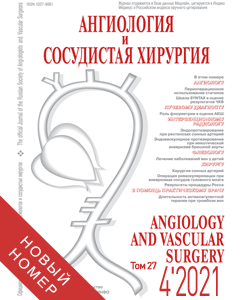Journal «Angiology and Vascular Surgery» •
2016 • VOLUME 22 • №2
Outcomes of carotid endarterectomy performed in acute stage of ischaemic stroke
Shatravka A.V.1, Sokurenko G.Yu.2, Suvorov S.A.3, Rizakhanova M.R.4, Loginov I.A.3, Alekseeva N.V.1
1) Chair of Hospital Surgery No2, First St. Petersburg State Medical University named after Academician I.P. Pavlov,
2) Clinic No2, All-Russian Centre of Emergency and Radiation Medicine named after A.M. Nikiforov under the RF Ministry of Emergency Situations,
3) Department of Surgical Treatment of Complicated Cardiac Arrhythmias and Electrocardiostimulation, Municipal Hospital No26,
4) Chair of Cardiovascular Surgery, North-Western State Medical University named after I.I. Mechnikov, St. Petersburg, Russia
Recent years have witnessed several studies concerning optimal terms of performing carotid endarterectomy after endured acute cerebral circulation disorder (ACCD). However up to now there is no common opinion regarding feasibility and safety of performing carotid endarterectomy in the acute period of ischaemic stroke. The 2013 Russian National Guidelines on surgical management of diseases of extracranial arteries point to feasibility of performing carotid endarterectomy at terms within up to 2 weeks after endured ischaemic stroke (level B evidence). At the same time, there is no data concerning possibility of performing this type of operation in patients with neurological deficit scoring 4 points according to the Rankin scale.
Analysing the results of 110 carotid endarterectomies performed in patients with haemodynamically meaningful stenosis of carotid arteries at terms varying from 2 to 14 days after the development of ipsilateral ACCD showed safety of the operation (the rate of postoperative cerebral circulation disorders amounted to 0.9% – 1 patient) and its efficacy in prevention of recurrent ischaemic complications, also determining regression of neurological symptomatology in the overwhelming majority – 86 (78%) patients.
Despite the absence of recommendations on possibility to perform carotid endarterectomy in patients after endured ACCD with neurological deficiency scoring 4 points according to the modified Rankin scale we proved efficiency and feasibility of performing this type of operation in the cohort of patients concerned. There was not a single case of transformation of the ischaemic focus into haemorrhagic one. One patient developed fatal ACCD. During the follow up period (12 months) regression of neurological symptomatology was observed in 16 (66.7%) patients of 24 operated patients with baseline deficit of stage 4 according to the Rankin scale.
KEY WORDS: carotid endarterectomy, acute cerebral circulation disorder, ischaemic stroke, acute period, Rankin scale.
P. 137
ARCHIVES MAGAZINE
2021 (Vol.27)
2020 (Vol.26)
2019 (Vol.25)
2018 (Vol.24)
2017 (Vol.23)
2016 (Vol.22)
2015 (Vol.21)
2014 (Vol.20)
2013 (Vol.19)
2012 (Vol.18)
2011 (Vol.17)
2010 (Vol.16)
2009 (Vol.15)
2008 (Vol.14)
2007 (Vol.13)
2006 (Vol.12)
2005 (Vol.11)
2004 (Vol.10)
2001 (Vol.7)
2000 (Vol.6)
1999 (Vol.5)
1998 (Vol.4)
1997 (Vol.3)


